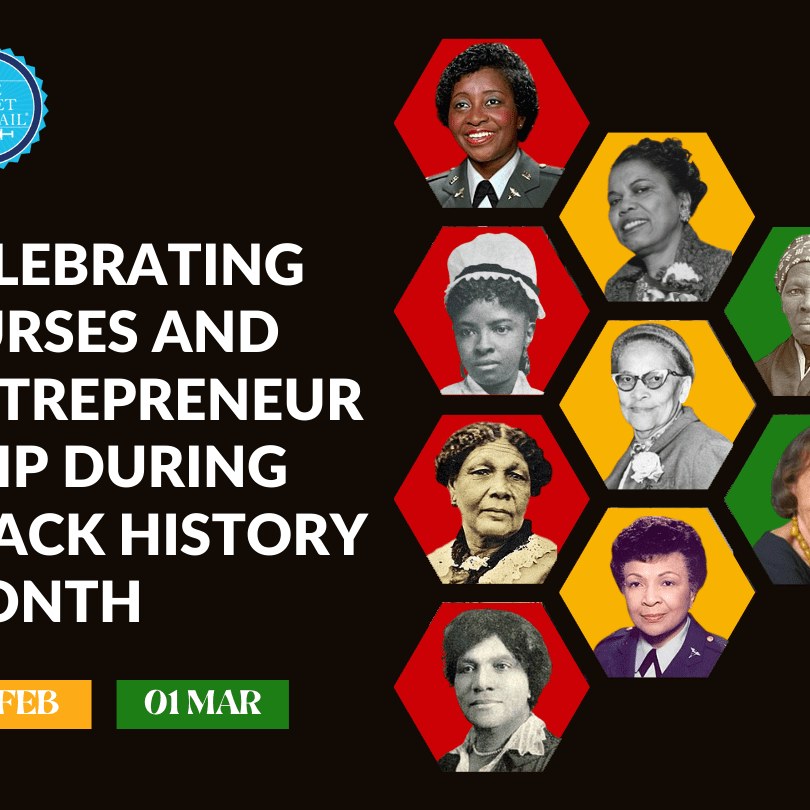Black History Month is not just a time to remember contributions Black Americans have made, but also a time to hear some of the untold stories of these pioneers who helped redefined healthcare.
In the realm of healthcare, the contributions of Black professionals have played a pivotal role in shaping the landscape of nursing, advocacy, and public health. As we celebrate Black History Month, it’s essential to shine a spotlight on the trailblazers who have left an indelible mark on the nursing profession, breaking barriers and paving the way for future generations.
From advocating for racial equality to revolutionizing nursing education, these remarkable individuals have significantly contributed to the advancement of healthcare. Let’s explore their stories.
Adah Belle Thoms (1870-1943):
Adah Belle Thoms stands as a beacon of resilience and determination in the face of racial adversity. Despite being denied official titles due to her race, Thoms became the assistant superintendent of nurses at Lincoln Hospital in New York in 1906. Her leadership at Lincoln Hospital continued for an impressive 18 years, emphasizing her commitment to progress in the nursing profession.
Thoms co-founded the National Association of Colored Graduate Nurses (NACGN) and served as its president from 1916 to 1923. Through her advocacy, she successfully lobbied for the inclusion of Black nurses in the American Red Cross Nursing and Army Nurse Corps during World War I, breaking racial barriers in military nursing. Thoms also authored “Pathfinders: A History of the Progress of Colored Graduate Nurses,” the first chronicle of the history of Black nurses in America, shedding light on their contributions and challenges.
Mary Eliza Mahoney (1845-1926):
Mary Eliza Mahoney, the first African American nurse to earn a nursing degree in the United States, epitomizes perseverance and leadership. Born to freed slaves, Mahoney worked her way through various roles at a hospital, ultimately earning her nursing degree in 1879. She pursued a career as a private nurse, focusing on individualized patient care.
Mahoney’s leadership skills and commitment to excellence made her a trailblazer despite facing racial and gender-based challenges. In 1920, she was among the first women to register to vote in Boston. Recognizing the importance of business aspects in healthcare, Mahoney combined clinical expertise with organizational understanding, leaving an enduring legacy in nursing.
Mary Seacole (1805-1881):
Mary Seacole’s entrepreneurial spirit and dedication to nursing during the Crimean War showcase her resilience and innovation. Facing difficulty in obtaining a nursing position, Seacole independently cared for sick soldiers with natural remedies. In a strategic move, she established the “British Hotel” near the Crimean war front, initially intended for sick and convalescent officers. When told overnight services were unnecessary, Seacole adapted, turning the location into a successful convenience store and catering service.
Seacole’s ventures extended beyond nursing; she ran a convenience store in Panama before the creation of the Panama Canal, catering to travelers headed to California for the gold rush. Her book, “Wonderful Adventures of Mrs. Seacole in Many Lands,” published in 1857, became the first travel memoirs ever published by a Black woman, documenting her experiences in war-torn regions.
Harriet Tubman (c. 1822-1913):
While renowned for her role as an Underground Railroad Conductor, Harriet Tubman also made significant contributions to healthcare during the Civil War. Working at Freedman Hospital in Washington DC in 1886, Tubman extended her service, tending to the wounded and showcasing her commitment to healing.
In 1862, Tubman worked as a nurse in Beaufort, South Carolina, and was appointed matron of a hospital at Fort Monroe in Virginia, caring for sick and wounded Black soldiers. Tubman’s use of home remedies to treat diseases demonstrated her dedication to healthcare, earning her a place in the American Nurses Association Hall of Fame in 1976.
Estelle Massey Osborne (1901-1981):
Estelle Massey Osborne made history as the first African American woman to earn a master’s degree in nursing education. Her contributions extended beyond academia, as she authored numerous articles advocating for racial equality and nursing education.
As the president of the National Association of Colored Graduate Nurses (NACGN), Osborne played a vital role in advancing the rights and recognition of Black nurses. Her educational pioneer spirit and advocacy efforts significantly contributed to the progression of Black nurses in the healthcare landscape.
Mabel Keaton Staupers (1890-1989):
Mabel Keaton Staupers emerged as a force for change in public health and military nursing. Advocating for improved healthcare access for African Americans, Staupers played a pivotal role in breaking racial barriers in the Armed Forces Nursing Corps.
As the executive secretary of the NACGN, Staupers tirelessly worked for racial equality in nursing. Her impactful advocacy left an enduring mark on healthcare, particularly in improving access and opportunities for African Americans in the nursing profession.
Hazel W. Johnson-Brown (1927-2011):
Hazel W. Johnson-Brown’s achievements resonate as she made history as the first Black Chief of the Army Nurse Corps, achieving the rank of brigadier general. Beyond her military accomplishments, she was a dedicated educator and mentor, influencing future generations of nurses.
Johnson-Brown’s leadership paved the way for increased diversity in the military nursing profession, leaving a lasting impact on both the armed forces and the broader nursing community. Her pioneering spirit and commitment to mentorship shaped the trajectory of nursing for years to come.
Betty Smith Williams (b. 1926):
Betty Smith Williams stands as a pioneer in nursing education, becoming the first African American to earn a Doctorate in Education from Teachers College, Columbia University. Her leadership at the National Black Nurses Association (NBNA) played a crucial role in advocating for the rights and recognition of Black nurses.
As an educator and scholar, Williams contributed significantly to the advancement of nursing knowledge, leaving an enduring legacy in both academia and advocacy. Her groundbreaking achievements paved the way for increased representation and opportunities for Black nurses.
Brigadier General Clara L. Adams-Ender (b. 1939):
Brigadier General Clara L. Adams-Ender’s trailblazing career in military leadership opened doors for women, particularly African American women, in the U.S. Army. Achieving the rank of brigadier general, she made history as the first woman in the U.S. Army to receive a direct commission in the Army Nurse Corps.
Conclusion:
The stories of these ladies collectively form a rich tapestry of Black excellence in healthcare. Their resilience, innovation, and commitment to equality have not only shaped the history of nursing but continue to inspire generations of healthcare professionals. As we celebrate Black History Month, let us remember and honor these trailblazers for their remarkable contributions to the advancement of healthcare and the nursing profession.
Written by: Aubrey Bartolome a creative writer for The Secret Cocktail®
If you are interested in starting a healthcare training school in your state, we can help! From CNA Schools, Phlebotomy Schools and more we can help launch a training school. Please contact us at info@thesecrtecocktail.com to learn more about our services or click here.

